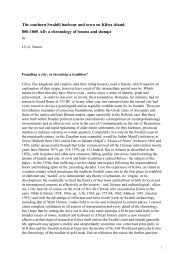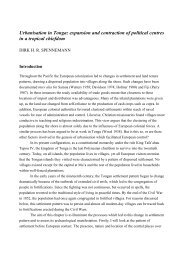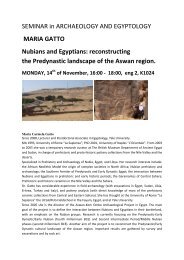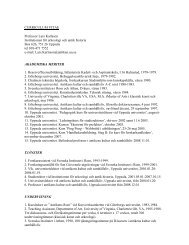Beowulf - Institutionen för arkeologi och antik historia
Beowulf - Institutionen för arkeologi och antik historia
Beowulf - Institutionen för arkeologi och antik historia
You also want an ePaper? Increase the reach of your titles
YUMPU automatically turns print PDFs into web optimized ePapers that Google loves.
III. The Characteristics of the<br />
Good<br />
The Model Behaviour<br />
The good is an itinerary on which the traveller, the individual, is bound to meet with<br />
all kinds of difficulties, intentional ones, with the purpose of being on purpose, and<br />
rational as well as surprising and emotional difficulties. All difficulties must be overcome<br />
in order to reach the goal, i.e., a life governed by friendship in familial and<br />
communal affiliation. Seen in this light, the good is linked to what Nussbaum considers<br />
a classical and Aristotelian tradition of ethics (cf. 1992, p. 10, col. 4 f.). But the<br />
mechanistic way in which a man like <strong>Beowulf</strong> travels and brings us along through the<br />
necessary stages of goodness seems also to echo a kind of unreflected normative<br />
code of honour and loyalty which Ceasar and Tacitus noted in the noble, but savage,<br />
early German (Caesar, De Bello Gallico VI. 22. 2; Tacitus, Germania VIII–IX;<br />
Thompson 1965, pp. 8 ff.).<br />
In my opinion this kind of virtue made it worthwhile for the Romans in the century<br />
around the birth of Christ to pick out some Germanic leaders and support them in<br />
order to make them more Romanly civilised. The support made it possible for these<br />
leaders to be generous and responsible, and in this way, the Romans inspired a new<br />
Germanic virtue: that of being economically powerful and generous in a socially responsible<br />
way. Eventually this kind of generosity created the form of loyalty and<br />
goodness, which is evident in <strong>Beowulf</strong>.<br />
The initial contact between Hroðgar and the child <strong>Beowulf</strong> is thus, on the one<br />
hand, an example of an unconditional goodness related to Aristotelian ideas of ethical<br />
reflection telling us that in principle, goodness needs an unconditional start in<br />
149








